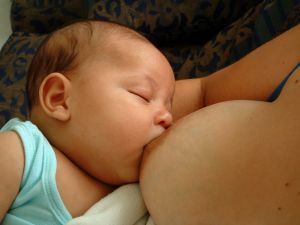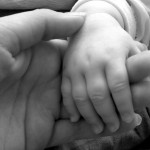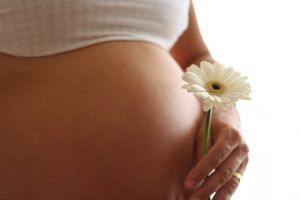By Kathleen Mitchell-Askar, Pregnancy & Birth and Feeding Editor for The Attached Family
 A study published in the April 2010 issue of The Journal of Pediatrics by The Western Australian Pregnancy Cohort (Raine) Study suggests that breastfeeding may have a positive effect on children’s and adolescents’ mental health. A paper that appeared in the Journal of Child Psychology and Psychiatry listed children’s mental health as one of the six priority areas in need of attention to improve the health and development of children and adolescents across the globe. At a time when 10 to 20% of children worldwide suffer from emotional or behavioral problems, a possible solution as simple as breastfeeding is one that could prove both attainable and powerful.
A study published in the April 2010 issue of The Journal of Pediatrics by The Western Australian Pregnancy Cohort (Raine) Study suggests that breastfeeding may have a positive effect on children’s and adolescents’ mental health. A paper that appeared in the Journal of Child Psychology and Psychiatry listed children’s mental health as one of the six priority areas in need of attention to improve the health and development of children and adolescents across the globe. At a time when 10 to 20% of children worldwide suffer from emotional or behavioral problems, a possible solution as simple as breastfeeding is one that could prove both attainable and powerful.
For more than 50 years, breastfed babies have been shown to hold developmental and cognitive advantages over non-breastfed children. Some studies have even shown that breastfed infants are better able to cope with adverse stimuli with more control, and children who were breastfed as infants exhibited greater resilience against the stress and anxiety associated with parental separation and divorce. These previously published studies are limited, however, by their small, often nonrandom, samples.
The Australian study derives its strength from its large sample size, longitudinal nature, and excellent response fractions. From 1989 to 1992, the Western Australian Pregnancy Cohort enrolled 2,900 pregnant women during their second trimesters who went on to deliver at the major obstetric hospital in Perth. Researchers gathered data on both parents’ familial, social, economic, and demographic backgrounds, along with their medical and obstetric histories, and updated the data during the 34th gestational week. The newborns (both singletons and twins) were initially examined by a midwife or pediatrician at two days postpartum, and 2,868 live births were included in the study. These children were followed until age 14.
The study focused on the parent-report Child Behaviour Checklist (CBCL) as the outcome variable at the five-, eight-, ten-, and 14-year follow-ups. The two-year-old children were evaluated with a similar questionnaire, modified with appropriate sleep questions and other subtle differences relative to the age group. Parents completed the 118-item CBCL, which measures behavioral psychopathology in children according to eight syndrome constructs:
- Withdrawn
- Anxious/depressed
- Somatic complaints
- Social problems
- Attention problems
- Thought problems
- Delinquent behavior
- Aggressive behavior.
Withdrawn; anxious/depressed; and somatic complaints were grouped and scored as “internalizing problems.” Delinquent and aggressive behaviors were treated as “externalizing problems.” The results from the CBCL were converted into age/sex-appropriate scores. The higher the score, the more problematic the child’s mental health.
A little over half of all mothers in the study (52%) breastfed for six months or longer, and 11% never breastfed at all. Nineteen percent of the children were breastfed for less than three months, 19% for three to six months, 28% for six to 12 months, and 24% for 12 months or more. The study investigated the effects of exclusive breastfeeding but found it did not change the conclusions drawn from the data with “any” breastfeeding (breastfeeding with the addition of solid food).
The study’s findings point to a boon for breastfed children: The longer a baby fed at the breast, the lower the child’s score on the CBCL, and the trend continued through adolescence. The differences between breastfed and non-breastfed children were most distinct in the total and externalizing scores. Even after researchers controlled for such confounding factors as maternal age at birth, maternal education, maternal smoking, family structure (whether the biological father lived with the family), life stress events, and maternal postnatal depression — all of which have been linked with higher rates of mental health problems — shorter breastfeeding duration was “consistently associated with increased risks for mental health problems of clinical significance through childhood and into adolescence,” the study concludes.
Despite the promising findings on the effects of breastfeeding on mental health, whether the positive correlation was due to breastmilk itself or the maternal-child bond cultivated at the breast was unclear. It is known that the fatty acids and other bioactive components in breastmilk positively contribute to child development and health. The hormone leptin, also found in breastmilk, may reduce stress in infants through its effects on the hippocampus, hypothalamus, pituitary gland, and adrenal gland.
Breastfeeding mothers have also been shown to touch their babies and gaze into their eyes more often. Such stimulation has not been linked with better mental health in human studies yet, but the Australian researchers cite a study on rat pups, and those that received a greater amount of maternal contact were better able to cope with stress as adults.
According to the study, “Breastfeeding may also be an indicator of a secure attachment status, which is known to have a positive influence on the child’s psychological development into adulthood.”
Even though breastmilk is the healthiest first food for a child, if a mother cannot or chooses not to breastfeed, it is possible that the attachment between parent and child affects the child’s mental health more profoundly than does the food itself. By practicing Attachment Parenting, holding the baby close while bottle-feeding, and increasing the amount of touch through babywearing, the mother of a non-breastfed baby could give her child mental-health benefits similar to those enjoyed by a breastfed baby. Parents who give proper attention to their children and remain present with them, whether breastfeeding or not, will make their child feel cherished and have a positive effect on his or her self-esteem.
But, as the Western Australian Pregnancy Cohort (Raine) Study shows, “breastfeeding for a longer duration appears to have significant benefits for the onward mental health of the child into adolescence…Therefore, interventions aimed at increasing breastfeeding duration could be of long-term benefit for child and adolescent mental health.”




 During my second pregnancy, I was a ball of nerves. While my baby was born healthily, she was of a lower birth weight than what was expected – only six pounds for a term baby. My doctor had warned me that not finding a way to lessen my anxiety during the pregnancy could cause problems, and one of those was a low birth weight.
During my second pregnancy, I was a ball of nerves. While my baby was born healthily, she was of a lower birth weight than what was expected – only six pounds for a term baby. My doctor had warned me that not finding a way to lessen my anxiety during the pregnancy could cause problems, and one of those was a low birth weight. A study to be published in the March issue of Behavior Therapy, “Generalized Anxiety Disorder: Connections with Self-Reported Attachment,” credits secure parent-child attachment in lessening the risk of that child eventually developing a severe anxiety disorder as an adult.
A study to be published in the March issue of Behavior Therapy, “Generalized Anxiety Disorder: Connections with Self-Reported Attachment,” credits secure parent-child attachment in lessening the risk of that child eventually developing a severe anxiety disorder as an adult. So many first-time moms are caught off-guard by their emotions after giving birth to the baby they’ve been waiting for months, even years, to join their family. It’s completely normal to feel a letdown after the big day. After all, childbirth is a life-changing experience in every way. What new moms and their partners need to do is understand how to recognize the “baby blues” and what can help until they go away…usually in a couple weeks.
So many first-time moms are caught off-guard by their emotions after giving birth to the baby they’ve been waiting for months, even years, to join their family. It’s completely normal to feel a letdown after the big day. After all, childbirth is a life-changing experience in every way. What new moms and their partners need to do is understand how to recognize the “baby blues” and what can help until they go away…usually in a couple weeks.